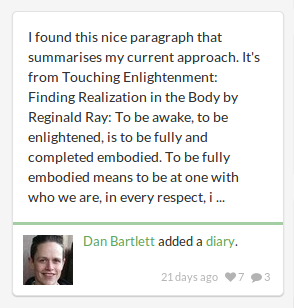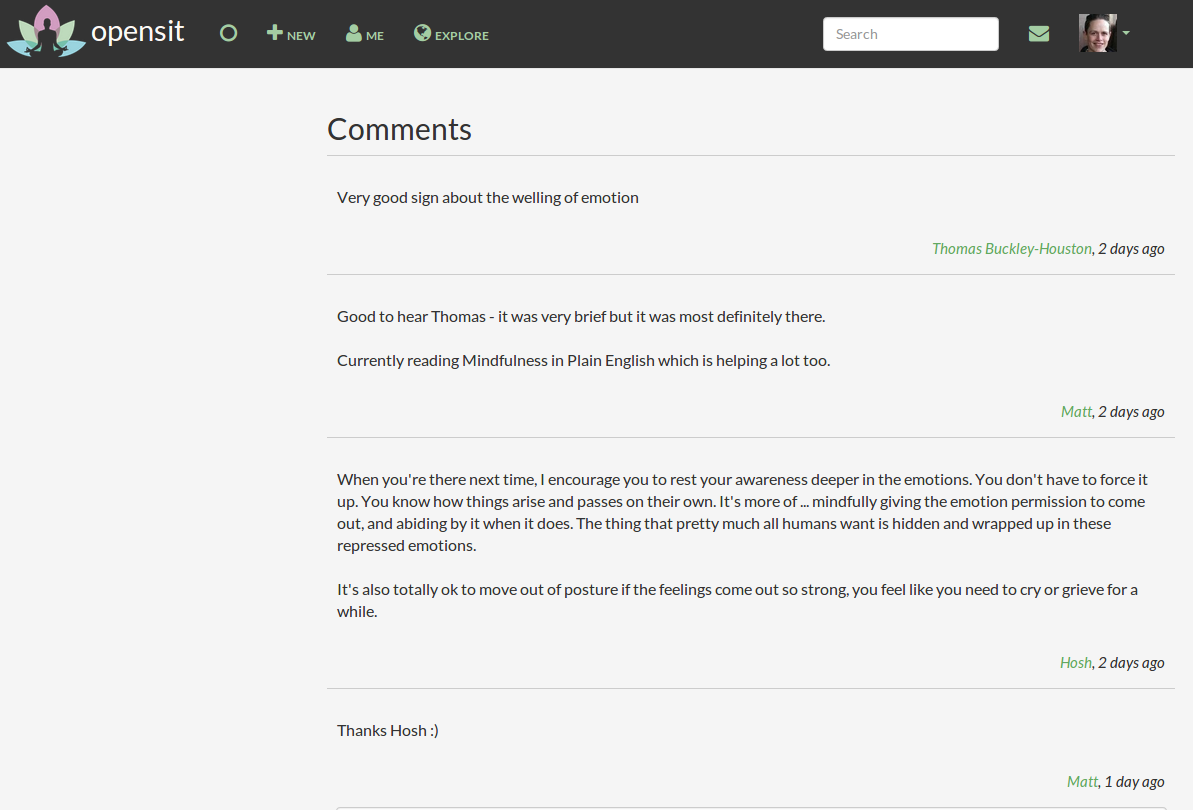2021 note: this post was written 7 years ago, when I was the founder of a meditation community known as OpenSit. Times have changed and OpenSit is no longer online. If you’re looking for some way of starting up a meditation journal today, many meditation apps have some journalling functionality built in. Failing that, any paper pad will do!
So you’re already sold on meditation right?
You read all those convincing studies. Your own personal experience has been resoundingly positive. And you saw those pictures on the Internet of beautiful yoginis basking in effortless full-lotus serenity next to waterfalls, beaches and other scenes of outstanding natural beauty.

For those of us that don’t have access to waterfalls or the Grand Canyon, a simple meditation journal can really enhance our practice. Meditation journals are a great way of tracking, as well as improving, your meditation practice.
So what are the 7 best reasons for starting a meditation journal?
1. Reflect on what you’ve achieved
It’s all too easy to let our entire journey be coloured by whatever foul mood has arisen in the last 10 minutes.
You made it to the cushion but you can’t stop thinking about that insufferable idiot at work. You lost your Zen and your mind is thrashing around like an angry chimp in a small cage.
Oh well I’ve got better things to do, God I really need to make a huge sandwich, what has meditation practice ever done for me anyway…

And after inhaling that sandwich to fill the empty gap in your stomach/soul, then comes the guilt. At this point we quickly play down what we have achieved.
A journal provides the kind of perspective that emotions and habitual reactions quickly block out. Reading over your journal will constantly surprise you. And we’re not just talking about the bad times; no matter how Earth-shattering your last insight was, you might be surprised reading your journal a week on, when it’s completely slipped from your memory.
When you read over your journal, you may notice certain patterns occuring much more or less than you thought. Our memories are rarely as accurate as we think, and there are a variety of neural mechanisms that make recollection slightly less than objective.
As with most things, insight in meditation is a case of returning to the basics again and again. When you journal, you are creating a library of your personal insights, ready to reflect upon and work with whenever you feel ready.
A journal gives you a deeper sense of your journey, and the ability to reflect on events several months or years after they changed your life. A journal drives home the fact that our minds are changeable, and that this is both the reason meditation is possible, and the reason we need it.
Try this: each Sunday read back over any reports from the week. Write down 3 patterns or insights to focus on for the next week.
2. Learn from others
One of the reasons I built OpenSit was my passion for reading other people’s journals. They gave me so much inspiration and insight, especially when I had no one else to talk to about meditation.
The traditional ways of keeping journals have made it hard to learn from other people’s insights, but OpenSit changes this. Putting journals on a social platform allows anyone the benefit of soaking up the wisdom, insights and mistakes of others.
If you’re just starting out, following other peoples journals is a great way to pick up tips, tricks and advice from more experienced meditators. Maybe it’s a novel way to relax your body before sitting, or a meditation technique explained in a way that FINALLY makes sense to you, or a great one-liner that you want to use in your own practice.
The way to get smart is to surround yourself with smart people. Want to make meditation a strong, resilient habit that is always improving your well-being? Then surround yourself with others who are doing that!
Even if you don’t understand everything you’re reading, these things often sink in on a deeper level, ready to re-emerge at the opportune time. Even if that feels a long way off, these little snippets of insight can give us an exciting taste of things to come!
3. Strengthen your regular practice
When you first start meditating, it can be difficult to maintain a regular practice. But as most experienced yogis agree, once the practice is in place, the regularity becomes a natural rhythm.
Maintaining an online journal starts a positive feedback loop that can help you find that rhythm quicker.
- You sit.
- You share your practice.
- You get encouragement and kudos on your sit.
- You are super inspired and want to sit every day forever. Next to a waterfall.
Easy right? Hey, we all have a hard time with practice sometimes, but having friends there to give you props and pick you up when things feel really crappy is a great way to boost your likelihood of cementing the habit in place.

4. Get feedback on your practice
Meditation practice has traditionally been a solitary endeavour. But the way we practice is constantly evolving, and today there are lots of novel approaches that emphasise mutual support and practice within our daily lives.
Teacher-student relationships are still valuable, as are meditation courses and retreats, but an online journal can give you access to a global community of yogis, from all levels of experience.

Got a question about meditation? Use your entries to ask questions to the community, and see what you get back.
5. Track your goals
If you’ve taken up a meditation challenge, the journal is a perfect way to track your progress.
OpenSit let’s you know when you’re on a streak - a continuous period where you’ve sat each day, making challenges like the 21 day meditation challenge easier to track.

Try making mini-goals each week or month.
- Set your goal.
- Check back over your timeline and see how you did.
- Set another goal, either something a bit more challenging, or a little more forgiving, and see how you progress over time.
6. Change how you understand yourself
Each time you write down your experiences, you are not simply regurgitating something that has already happenend. Verbalising what happened actually means that we re-process the experience, and understand it in different ways.
While it’s never good to get bogged down in too many ideas or concepts to pin down the basic, immediate truth of our experience, refining our view of ourself and our practice is essential. As I was once told on retreat:
Trust your experience. Refine your view.
Verbalising what happened, while not necessary all the time, can really change the way we understand the journey.
7. Feel less weird
And finally, whatever stage you feel your practice is at, it’s profoundly normalising to read about other people’s journeys into meditation.
You know that amazing practice that makes you stutter and choke when people ask you about it at the dinner table? NOT ANY MORE.
Being a part of a community that understands your Kundalini awakenings and sympathises with your internal energetic tantrums can really inspire us to carry on, a spiral deeper in to this ever-evolving practice. You’re not alone.

Hey you.
Interested in inner work, wisdom and learning?
